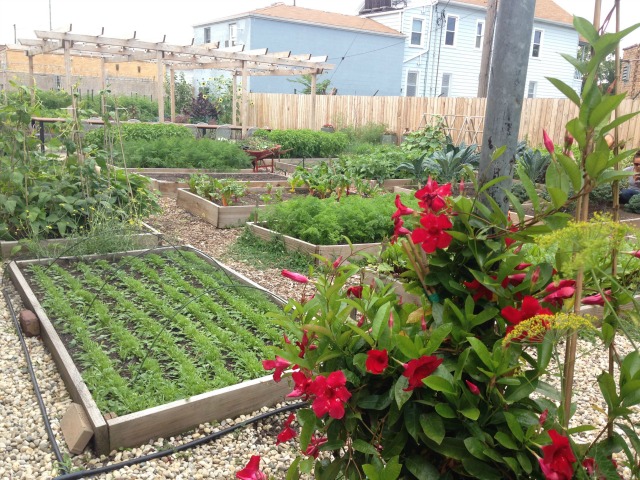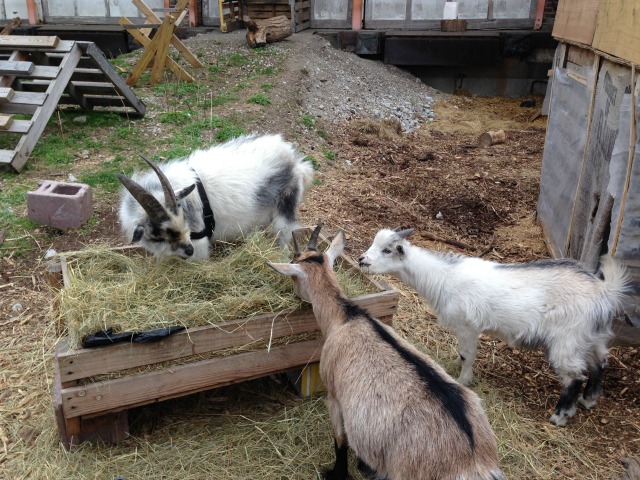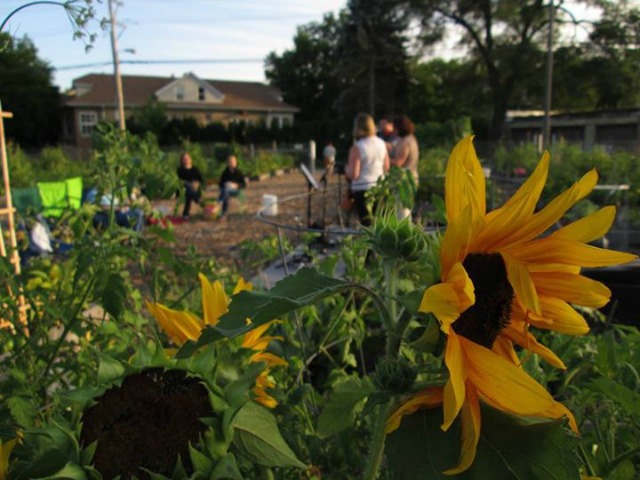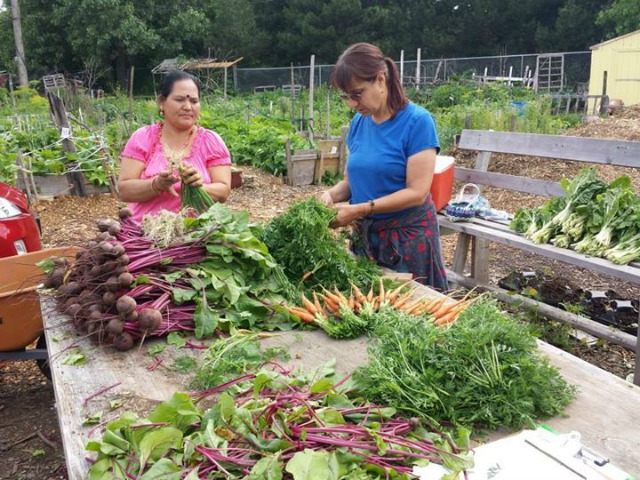The Best Urban Farming In Chicago
By Lisa White in Best Of on May 20, 2015 9:10PM
As much as we love our bright lights and big city, sometimes we just need to reconnect with Mother Nature. Dig our hands in some dirt, savor vegetables fresh from the garden and feel a connection with the ground below our feet. Thankfully, Chicago has a bevy of urban farming options for the most novice to serious green thumbs in the city.
Today we share some of our favorite green spaces where you can get your urban farming on, support local farmers or simply volunteer and connect with nature. From a farm built by a refugee community in Albany Park to rooftop gardens on the south side and even vertical aquaponics in Back-of-the-Yards, here are some of our favorite urban farming communities across Chicago.

(Big Delicious Planet./ Photo: Melissa McEwen)
Big Delicious Planet
Tucked away in an industrial area of West Town is a gorgeous garden run by catering company Big Delicious Planet. You can grab lunch at the canteen on weekdays and eat it under a trellis of blooming flowers. Some of the organic garden's bounty will be on the menu as well—they grow 85 different types of vegetables, fruits, herbs and edible flowers. They also do occasional dinners in the garden, which can make for a wonderful place to host a special event. —Melissa McEwen
Big Delicious Planet is located at 412 N. Wolcott Ave.
62nd Street Garden
Sitting near the borders of Hyde Park and Woodlawn on Chicago’s South Side, 62nd Street Garden has community plots for both longtime South Side residents and University of Chicago students and professors. It's technically two gardens on opposite sides of Dorchester Avenue and was established in March 2010 following a heated battle between community members and the university over plans to redevelop previous communal land on 61st Street. I love visiting when I’m down by the Experimental Station on Saturday mornings for the 61st Street Farmers Market. Though it is mostly used by individual plot tenants who grow food for themselves to eat, the garden also participates in KAM Isaiah Israel's White Rock Gleaning Program, which has volunteers collect unharvested food to donate to local shelters. An individual plot costs $50 to rent for the year (April-Nov.15). —Rachel Cromidas
62nd Street Garden is located at the intersection of 62nd St. and S. Dorchester Ave.
Windy City Harvest
Windy City Harvest is helping to cultivate a new crop of urban farmers. With their apprenticeship program, they offer a nine-month course in sustainable urban agriculture for a vast array of people, such as those looking for a career change, individuals with a history of incarceration or others who have struggled with finding employment. The program includes a paid internship, wherein the students work at urban farms that partner with the program. Most of the graduates go on to find seasonal or full-time work within the industry, and the food they harvest, more than 300,000 pounds according to WCH, feeds many. Their produce is for sale through wholesale, retail and government-subsidized distributors. It's a program that gives back in a multitude of ways. If you want a glimpse of what the program offers, I suggest checking out one of their workshops. Open to the public and affordable, the topics are geared towards small-scale farming. Check out their 2015 schedule here and sign up quickly, the classes are small in size which is great for getting some personal attention for your green thumb. — Lisa White
Windy City Harvest has locations and events at gardens across the city.
The Peterson Garden Project
The Peterson Garden Project is a community gardening education and resource hub with multiple “pop-up” locations around the city. Garden members pay $75 to get a 4X8 garden plot for the year in one of the project's pop-up Victory Garden locations in Rogers Park, Andersonville or Lincoln Square, along with access to various educational and community events. Its mission is to help community members learn how to grow their own food and improve their diets—and make the city more sustainable. —Rachel Cromidas
The Peterson Garden Project has multiple locations around Chicago’s Far North Side.
St. Paul And The Redeemer Food Garden
St Paul and the Redeemer is an Episcopal church with a lot of character and energy. Located near the border of the Hyde Park and Kenwood neighborhoods, SPR has a vibrant and diverse congregation that practices “radical grace” through their multitude of outreach programs. One of these programs is a food garden that produces more than 2,500 pounds of organic produce which they then donate to local soup kitchens and shelters. Volunteering at the garden is open to everyone, whether you are a member of SPR or not. Just make your way there any Saturday (April-October) from 9:00-11:00 a.m. and be ready to get your hands dirty! — Sophie Day
St. Paul and the Redeemer Food Garden is located at 4945 S. Dorchester Ave.
Global Garden Refugee Training Farm
I first found out about, and fell in love with, the story of the Global Garden Refugee Training Farm after reading Mike Sulla's awesome profile in the Reader. Tucked away in Albany Park, the plot of land was transformed into a thriving garden after 100 families from Bhutan and Burma took over the spot. What started out small has grown within the refugee community, and now there are more applicants than farm plots. The farm has been attempting to find a second site to expand, but for now they are thriving in their smaller digs. Produce is sold directly from the farmers during on-site markets twice a week. As well, the group had a stand last year at Horner Park's Saturday farmers' market and they've expanded their CSA efforts and have even sold some of their products to local restaurants. If you truly want to support a homegrown neighborhood project, head up to Albany Park and show Global Garden some love. — Lisa White
Global Garden Refugee Training Farm is located at the corner of Sacramento and Lawrence Ave.
Wood Street Urban Farm and Training Center
Growing Home is an organization dedicated to helping people attain self-sufficiency through on-farm job training. Their Englewood farms are the only certified organic urban farms in Chicago, growing everything from tomatoes to collard greens every March to December. Tour their Wood Street farm and enjoy fun activities like cooking demos and a salad challenge at their open house on Saturday, June 13. —Melissa McEwen
Wood Street Urban Farm and Training Center is located at 5814 S. Wood St.

Growing Power./ Photo: Melissa McEwen
Growing Power's Chicago Iron Street Farm
When you visit you might be a bit intimidated by the industrial concrete and rust wasteland that surrounds the Iron Street Farm. But behind the gate is one of the coolest farms in Chicago, with a small herd of adorable pygmy goats and a range of exciting projects, from growing mushrooms in giant bags suspended on the ceiling to hoop houses that produce crops year round. If you have a chance to come to a workshop or event here, take it.—Melissa McEwen
Growing Power's Iron Street Farm is located at 3333 S. Iron St.
The Plant
The Plant, a vertical aquaponics farm in Back-of-the-Yards, has a poetic take on urban farming. Located inside a defunct meat-packing warehouse in the middle of an urban food desert, The Plant uses a fish hatchery, hydroponic garden and commercial kitchen to produce fresh vegetables within a net-zero energy system—meaning it’s growing food for a needy community with no waste and minimal tax on the environment. It also serves as a business incubator for several urban farms and an education center for public school students. —Rachel Cromidas
The Plant is located at 1400 W. 46th St.
The Gary Comer Youth Center Rooftop Garden
Besides offering up a vast array of wonderful community programs, the Gary Comer Youth Center also houses an impressive rooftop garden. Besides being a wonderful learning space and living classroom for kids, the community is welcome to contribute and help take care of the garden throughout the year. Every day children at the center dine on a delicious variety of healthy options from the garden, with any excess distributed between local restaurants and sold at farmers' markets in the area—the center produces 1,000 pounds of fruit and vegetables annually. The green space is also helping out with maintenance costs for the center, saving them $250 annually on heating and cooling costs, thanks to the microclimate on the roof cooling things down during the summer and helping to warm up the facilities in the winter. — Lisa White
The Gary Comer Youth Center Rooftop Garden is located at 7200 S. Ingleside Ave.

